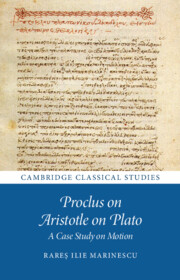Refine search
Actions for selected content:
60695 results in Classical studies (general)
Quotations, Translations and Transcriptions
-
- Book:
- Medieval Responses to Ovid's Exile
- Published online:
- 27 May 2025
- Print publication:
- 12 June 2025, pp xi-xi
-
- Chapter
- Export citation
Copyright page
-
- Book:
- Medieval Responses to Ovid's Exile
- Published online:
- 27 May 2025
- Print publication:
- 12 June 2025, pp vi-vi
-
- Chapter
- Export citation
Acknowledgements
-
- Book:
- Medieval Responses to Ovid's Exile
- Published online:
- 27 May 2025
- Print publication:
- 12 June 2025, pp ix-x
-
- Chapter
- Export citation
(RE)APPRAISING THE PARTHENON FRIEZE: ‘DIVINESPACE’ AND ‘MORTALSPACE’
-
- Journal:
- The Classical Quarterly , First View
- Published online by Cambridge University Press:
- 11 June 2025, pp. 1-23
-
- Article
-
- You have access
- Open access
- HTML
- Export citation
DENOMINATIVE VERBS FROM ATIMIA IN THE ATTIC ORATORS AND BEYOND
-
- Journal:
- The Classical Quarterly , First View
- Published online by Cambridge University Press:
- 09 June 2025, pp. 1-16
-
- Article
-
- You have access
- Open access
- HTML
- Export citation
REVIVING PAST POTENTIALS IN CLASSICAL GREEK
-
- Journal:
- The Classical Quarterly , First View
- Published online by Cambridge University Press:
- 09 June 2025, pp. 1-18
-
- Article
-
- You have access
- Open access
- HTML
- Export citation

Proclus on Aristotle on Plato
- A Case Study on Motion
-
- Published online:
- 05 June 2025
- Print publication:
- 19 June 2025
-
- Book
-
- You have access
- Open access
- Export citation
Abbreviations
-
- Book:
- Translating Virgil
- Published online:
- 15 May 2025
- Print publication:
- 05 June 2025, pp xxviii-xxx
-
- Chapter
- Export citation
Appendices
-
- Book:
- Translating Virgil
- Published online:
- 15 May 2025
- Print publication:
- 05 June 2025, pp 827-860
-
- Chapter
- Export citation
Chapter 3 - The Economics of Translating Virgil
-
- Book:
- Translating Virgil
- Published online:
- 15 May 2025
- Print publication:
- 05 June 2025, pp 206-268
-
- Chapter
- Export citation
Appendix 2 - Table of Translations Discussed
-
- Book:
- Translating Virgil
- Published online:
- 15 May 2025
- Print publication:
- 05 June 2025, pp 846-860
-
- Chapter
- Export citation
Prelude
-
- Book:
- Translating Virgil
- Published online:
- 15 May 2025
- Print publication:
- 05 June 2025, pp xv-xvii
-
- Chapter
- Export citation
Dedication
-
- Book:
- Translating Virgil
- Published online:
- 15 May 2025
- Print publication:
- 05 June 2025, pp vii-viii
-
- Chapter
- Export citation
Chapter 5 - Poetic Careers of Virgil Translators
-
- Book:
- Translating Virgil
- Published online:
- 15 May 2025
- Print publication:
- 05 June 2025, pp 355-398
-
- Chapter
- Export citation
Chapter 4 - Competition, Retranslation and Travesty
-
- Book:
- Translating Virgil
- Published online:
- 15 May 2025
- Print publication:
- 05 June 2025, pp 269-354
-
- Chapter
- Export citation
Chapter 8 - Fidelity of Form: Metre Matters
-
- Book:
- Translating Virgil
- Published online:
- 15 May 2025
- Print publication:
- 05 June 2025, pp 578-672
-
- Chapter
- Export citation
Chapter 9 - Fidelity of Concepts and Register
-
- Book:
- Translating Virgil
- Published online:
- 15 May 2025
- Print publication:
- 05 June 2025, pp 673-768
-
- Chapter
- Export citation
Appendix 1 - Important Translators’ Brief Biographies, with ODNB Link Where Available
-
- Book:
- Translating Virgil
- Published online:
- 15 May 2025
- Print publication:
- 05 June 2025, pp 827-845
-
- Chapter
- Export citation
Tables
-
- Book:
- Translating Virgil
- Published online:
- 15 May 2025
- Print publication:
- 05 June 2025, pp xxvii-xxvii
-
- Chapter
- Export citation
Chapter 1 - Translation, Nationalism and Transnationalism
-
- Book:
- Translating Virgil
- Published online:
- 15 May 2025
- Print publication:
- 05 June 2025, pp 56-120
-
- Chapter
- Export citation
